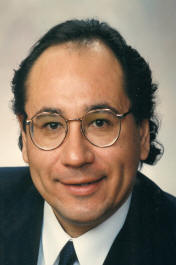
In the "never hurts to ask" department, Ron Volesky, one of my favorite liberal Democrats, has asked conservative Republican Governor Dennis Daugaard to appoint him to the South Dakota Supreme Court.
Volesky has an interview June 20.
Volesky's resume:
Volesky earned a bachelor's degree in government and international relations from Harvard University in 1976, a master's degree in journalism and mass communications from South Dakota State University in 1977 and a law degree from the University of South Dakota in 1980.
He has been a practicing attorney in South Dakota since 1980 and has appeared before the Eighth Circuit Court of Appeals in St. Louis and the South Dakota Supreme Court and admitted to practice before the United States Court of Claims [Tom Lawrence, "Volesky Hopes to Be First American Indian on State Supreme Court," 2011.06.07].
Volesky knows politics:
...Volesky, who has served 16 years in the South Dakota Legislature and one term on the Huron City Commission, has sought a legal post with the state before.
He was the Democratic Party nominee for attorney general in 2002, 2006 and 2010.
"I take it as a badge of honor I was nominated by a major party, by the Democratic Party, three times," Volesky said [Lawrence, 2011.06.07].
My conservative friends may challenge the claim that South Dakota Dems constitute a "major party." But my conservative friends will really rankle at this argument Ron makes for his appointment:
He said in addition to his experience in government and law, his heritage should also be a factor.
"There's never been a Native American serve as a justice on the South Dakota Supreme Court," Volesky said. "After 122 years of statehood, this could be a historic time for race relations in South Dakota."
He is an enrolled member of the Standing Rock Sioux Tribe [Lawrence, 2011.06.07].
Should we replace the first woman to serve on the South Dakota Supreme Court, the retiring Judith Meierhenry, with the first Native American justice? Would a tribal member of the high court help us white folks get along better with our red brethren? Is that historic possibility a good reason to pick a Supreme Court justice?
The Judicial Qualifications Commission will grapple with those questions and more June 20.

I think it's less important to ask about Volesky's race than it is to ask about his abilities to fairly interpret the law of the land. As a general principle, we shouldn't be seeking diversity or improving race relations (or closing the gender gap) at the expense of qualified people. If Volesky has the requisite knowledge, skills, and abilities to do the job, sure. If not, then no. If there's someone else with better knowledge, skills, and abilities, make sure that person gets appointed.
Merit - not the color of my skin, nor the religion to which I may/may not subscribe, nor the party to which I associate - should be the primary driver of selection for all positions.
"Merit" is a slippery idea.
People who start off ahead in the race because of ethnicity AKA white privilege and DO NOT acknowledge it but simply claim "merit" are being historically and sociologically ignorant assuming the best of the persons character OR willfully ignorant (defending the blind merit) or outright deceitful.
And I for one think we have too many governmental leaders with a sense of entitlement. In particular ultra- conservatives that ignore the privileges they are born with and claim merit. OR ultra-liberals who believe they are entitles to be a "governing" class of people/academics, etc.
Get honest about white privilege in western society in the merit discussion - then we can start comparing apples and apples.
Best to all!
Ron is a good person, lawyer and also an Indian. I have a brother in law who has been a black lawyer in Atlanta for a long time. He got a neighborhood a sewer system when he was told he could not do that. The white lawyers had not thought of that.
If we do not have a dozen qualified people we are short on leadership and good people. So whom ever gets in, you can say, but so and so could have done a good job also. But will the run of the mill person with no difference in background or experience actually make much difference.